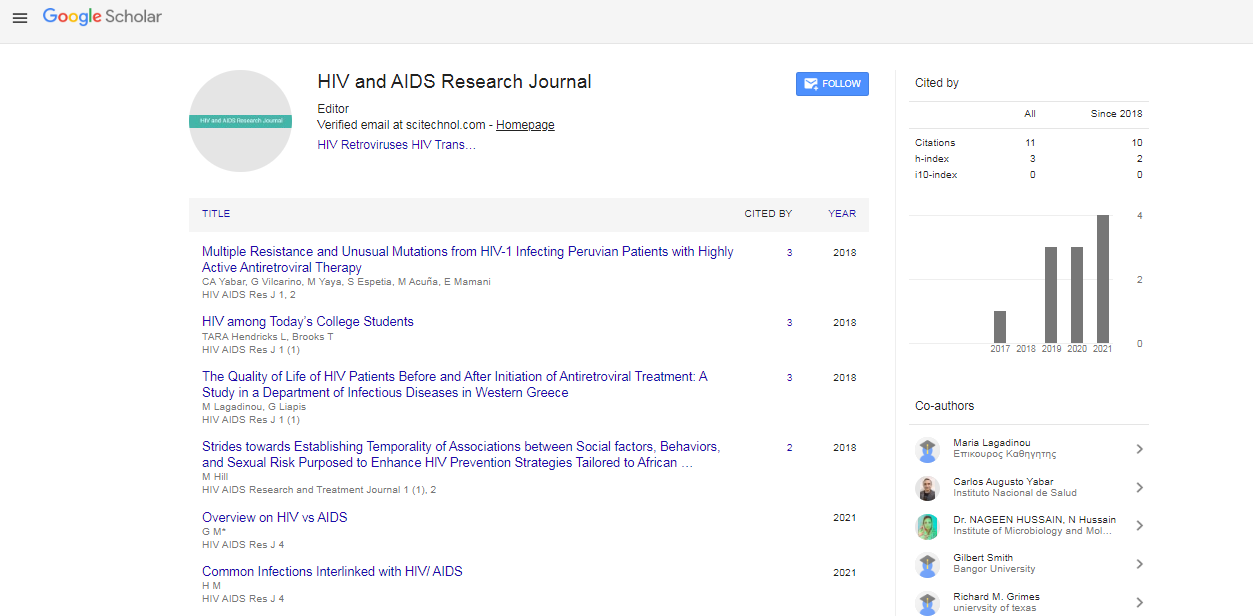Opinion Article, Hiv Aids Res J Vol: 6 Issue: 1
Revolutionizing HIV Care: Advances in Clinical Therapies
Paul Antonio*
Department of Nutrition, University of Sao Paulo, Sao Paulo, Brazil
*Corresponding Author: Paul Antonio
Department of Nutrition, University of Sao
Paulo, Sao Paulo, Brazil
E-mail: paulantonio@usp.br
Received date: 20 February, 2023, Manuscript No. HARJ-23-94888;
Editor assigned date: 22 February, 2023, PreQC No. HARJ-23-94888 (PQ);
Reviewed date: 09 March, 2023, QC No HARJ-23-94888;
Revised date: 16 March, 2023, Manuscript No. HARJ-23-94888 (R);
Published date: 23 March, 2023, DOI: 10.4172/Harj.1000121
Citation: Antonio P (2023) Revolutionizing HIV Care: Advances in Clinical Therapies. HIV AIDS Res J 6:1.
Description
Human Immunodeficiency Virus (HIV) remains a significant global health challenge, with millions of people living with HIV worldwide. Over the past few decades, significant advancements have been made in the field of HIV clinical therapies, leading to improved patient outcomes and changing the landscape of HIV management. These advancements have revolutionized the approach to HIV treatment, leading to increased viral suppression, improved quality of life, and prolonged survival for people living with HIV. One of the major breakthroughs in HIV clinical therapies has been the development of Highly Active Antiretroviral Therapy (HAART), also known as Combination Antiretroviral Therapy (CART). HAART involves the use of a combination of different antiretroviral drugs that target different steps of the HIV life cycle, such as reverse transcriptase inhibitors, protease inhibitors, integrase inhibitors, and entry inhibitors.
The use of HAART has resulted in a significant reduction in viral load, leading to improved immune function and decreased morbidity and mortality among people living with HIV. In addition to HAART, there have been advancements in other areas of HIV clinical therapies. One advancement is the use of Pre Exposure Prophylaxis (PREP), where antiretroviral drugs are used as a preventive measure for individuals at high risk of acquiring HIV. PREP has been shown to be highly effective in reducing the risk of HIV transmission, particularly among key populations such as transgender individuals, and people who inject drugs. Furthermore, advancements in the management of HIV drug resistance have also improved patient outcomes. Drug resistance can occur when the virus mutates and becomes resistant to the antiretroviral drugs.
However, newer generations of antiretroviral drugs with improved potency, safety, and tolerability profiles have been developed, providing more options for patients with drug-resistant HIV. Additionally, regular monitoring of viral load and resistance testing has become a standard part of HIV care, allowing for early detection of drug resistance and prompt adjustments to the treatment regimen. Another significant advancement in HIV clinical therapies is the management of comorbidities and complications associated with HIV infection. People living with HIV are at increased risk of developing other health conditions such as cardiovascular disease, liver disease, bone disorders, and mental health issues. Improved screening, monitoring, and management of these comorbidities have led to better overall health outcomes for people living with HIV.
Moreover, advancements in research and development have led to the development of novel therapies such as gene editing technologies, immune-based therapies, and long-acting antiretroviral drugs, which show promise in achieving a functional cure for HIV or eliminating the need for daily medication intake. These emerging therapies offer new possibilities for the future of HIV clinical management and may potentially transform the landscape of HIV care. Despite these significant advancements, challenges in HIV clinical therapies persist. Adherence to antiretroviral therapy, addressing healthcare disparities, ensuring access to care for marginalized populations, and addressing stigma and discrimination remain ongoing challenges in the field of HIV management.
Conclusion
Advancements in HIV clinical therapies have transformed the approach to HIV management, leading to improved patient outcomes and prolonged survival for people living with HIV. HAART, PrEP, advancements in managing drug resistance, and addressing comorbidities associated with HIV infection have resulted in significant progress in HIV care. Novel therapies on the horizon offer new possibilities for the future of HIV clinical management. However, challenges remain, and ongoing efforts are needed to address issues such as adherence, healthcare disparities, and access to care for marginalized populations, stigma, and cost concerns. Continued innovation, and collaborative efforts among healthcare providers, policymakers, and community organizations are essential to further advance HIV clinical therapies and ultimately achieve the goal of ending the HIV epidemic.
 Spanish
Spanish  Chinese
Chinese  Russian
Russian  German
German  French
French  Japanese
Japanese  Portuguese
Portuguese  Hindi
Hindi 